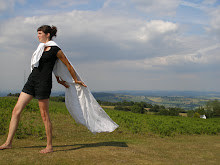 Written later: This picture, the sign of the church linked to the centre I was staying in, pretty much sums up my trip to Ischia: -nothing went right and, despite the kindness of strangers, I just had to escape back to the mainland as soon as I could. I found the bakery that supplied our dark-crusted bread. The baker's wife, who was young and very happy in her work, showed me around the silent and fairly large workrooms. Nose-tingling wafts of fermenting biga escaped under the lids of wooden dough troughs, and the ovens rattled as they cooled from the night's bake. She invited me to come and see the production, "especially"- (she blushed at her own enthusiasm) -"the wood-fired oven. It's beautiful!". It was, the lip of the hearth-stone worn shiny, and the straight-twigged faggots resting against it to dry for the next firing.
Written later: This picture, the sign of the church linked to the centre I was staying in, pretty much sums up my trip to Ischia: -nothing went right and, despite the kindness of strangers, I just had to escape back to the mainland as soon as I could. I found the bakery that supplied our dark-crusted bread. The baker's wife, who was young and very happy in her work, showed me around the silent and fairly large workrooms. Nose-tingling wafts of fermenting biga escaped under the lids of wooden dough troughs, and the ovens rattled as they cooled from the night's bake. She invited me to come and see the production, "especially"- (she blushed at her own enthusiasm) -"the wood-fired oven. It's beautiful!". It was, the lip of the hearth-stone worn shiny, and the straight-twigged faggots resting against it to dry for the next firing.However, because the bakery would not open for another 2 days, the next day being a Sunday followed by a Feast Day... and I didn't want to stay in Purgatory for that long, I decided to call it quits and head back to the mainland.
What did I learn, then, from such an abortive trip? I think back to what the bus driver was saying, recall that he changed the bus route so that he could show me 'the best bakery on Ischia'. What I saw was a brand new building, done up with massive, yellow wheat sheaves in lit-up plastic. It looked like a fast-food drive-in, and it made me feel uneasy, this glowing monster could swallow anything.
I thought about Michael Pollan's introductory chapter in his book In Defense of Food: He supposes that we will be asking something like "Why should I listen to an American [Pollan] telling me [a European] how to eat, surely America's food culture is worse?". He answers that we should listen to warnings from America because they've already been through the worst. For us Europeans the worst is still to come, if we let it. He argues that Europe is not superior to America in eating more healthily, it is simply behind. We have yet to experience the realisation that novelty and ease should not exclusively guide us in our choice of foods. Pollan is keen to help us avoid that point of desperation that America reached, where skill and a sense of connection to, and responsibility for, oneself and one's neighbours become so lost that it would take a revolution to recover it. Around America, in pockets, a renaissance in traditional, 'Slow' food production is taking place. People are trying to get back to the holistic life that accompanied naturally-evolved ways of making food. Despite the long-term benefits of the holistic approach, it takes a level of commitment that condemns it to remaining (sic) simply a fad for most of us if there are other, more easily visible temptations in the way. I felt the truth of this very keenly on Ischia, where the bus driver's sentimental attachment to the good bread of his childhood was overruled by the draw of clean-cut, brightly-lit modernity.

No comments:
Post a Comment